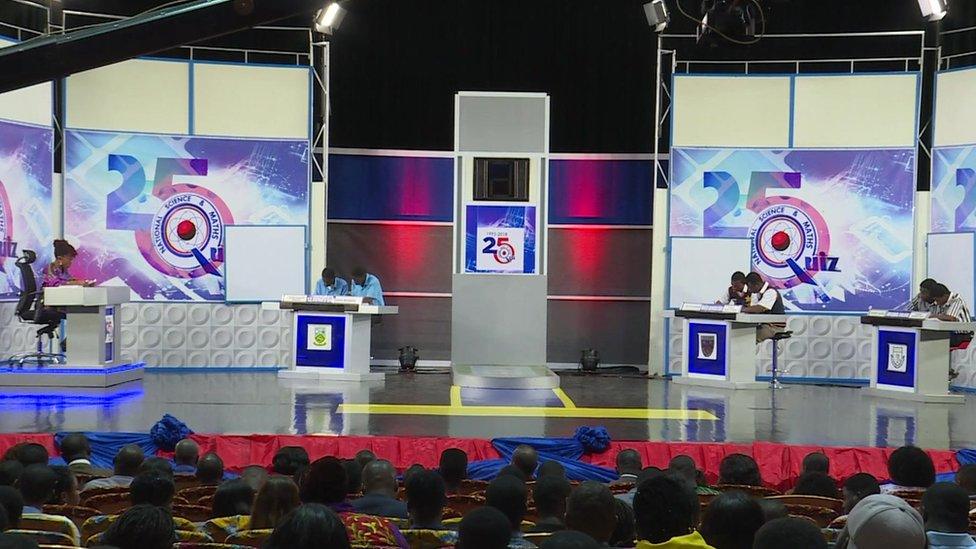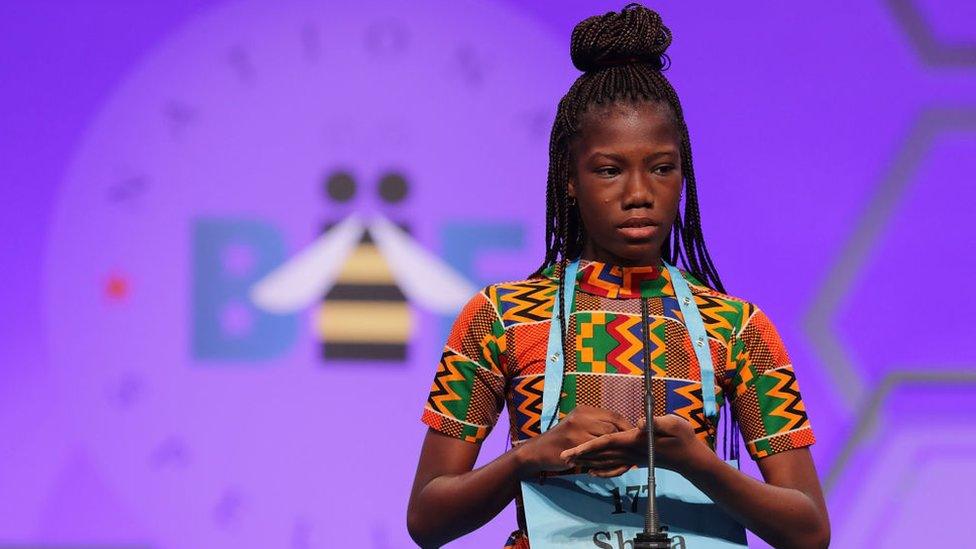Letter from Africa: The Ghana quiz show bigger than the World Cup
- Published
Kissi Annor Kwaku: "Our school hasn't won for a very, very long time"
In our series of letters from African journalists, Ghanaian writer Elizabeth Ohene gets quizzical.
We have just had the climax of one of the most exciting competitions. No, it was not the Fifa World Cup, which we have been watching without much passion since our cousins the Nigerians failed to make it out of the group stages.
The competition that has gripped the country for weeks was the finals of the National Science and Maths Quiz and the grand finale took place earlier this month.
The quiz is open to senior high schools and has been running on national television since 1994. It has a cult following among students, parents and especially old students of the schools who appear to be even more passionate than the current ones.
This is an enterprise that was started with the stated aim of promoting science and mathematics in our society and if one were to judge simply from the popularity of the programme, you would be tempted to say that the mission of the originators has been accomplished.

The quiz has a cult following
But I am beginning to think that it is not the content of the competition that is the source of its popularity but the competition for competition sake.
In other words, who won and who lost is more important than what the viewers and listeners might have learnt from the questions.
Female role models
The legend says that the programme was born when someone asked his friends why birds could stand on a live electric wire without getting electrocuted, but human beings could not do so. Luckily for him his friends were scientists and professors and they offered him an explanation.
One thing led to another and they decided that it would be a good idea to have a quiz programme on national television to promote science and mathematics.
One of them was a professor of biochemistry and she became the quiz mistress. She said she agreed to be quiz mistress to encourage females and young ones to become scientists.

Elizabeth Ohene:

I must confess I am not sure I know the answer to why birds don't get electrocuted

There have since been only female quiz mistresses and the current one is the third in the series, Quiz Mistress Dr Elsie Kaufmann, head of the biomedical engineering department at the University of Ghana, Legon.
So, has the success of the programme led to science and mathematics becoming more popular in our country? And what about the idea of using the programme to entice more young people to become scientists and serving as a role model for female scientists?
I have tried my own very unscientific survey on some young people. Almost all of them could tell me which schools had been doing well in the competition, but not one person could remember the questions that had been asked.
Since the competition started, more than 450 schools have participated but only 11 schools have won the first prize. Only once has a mixed school come on top and all the other times, the boys schools have been the winners.

Winners of Ghana's national Spelling Bee get to represent the country at the Scripps National Spelling Bee in the US
The girls schools I notice, make it to the quarters and a few times to the semi-finals but not once has a girls school made it into the finals.
And yet the girls schools do very well in the West African School Certificate Exams and feature prominently in the admissions into the medical schools, which would provide proof that they do well in science and mathematics.
Bottom of the rankings
But it looks like the country as a whole has some serious thinking to do about the state of science and mathematics in our schools and in our society as a whole.
The West African Examination Council has just announced the results of this year's West African School Certificate Exam results and they make sad reading.
We did not do well in mathematics and science and they are core subjects that the young people are required to get credits in to be able to get any further education.
Then there was the news item that shook the country back in 2015. The story said that Ghana had been ranked last among 76 countries across the world in the biggest ever global school rankings in mathematics and science.
This was a ranking said to have been done by the Organisation for Economic Co-operation and Development (OECD).
Nobody here took any comfort in the fact that other countries in the lowest ranks were Oman, Morocco, Honduras, South Africa which were ranked 72, 73, 74 and 75 respectively.
What should we make of our keenly contested National Science and Mathematics Quiz?
And I must confess I am not sure I know the answer to why birds don't get electrocuted when they stand on live electric wires. And it was this question that gave birth to the quiz in the first place.

More from Elizabeth Ohene:

Follow us on Twitter @BBCAfrica, external, on Facebook at BBC Africa, external or on Instagram at bbcafrica, external

